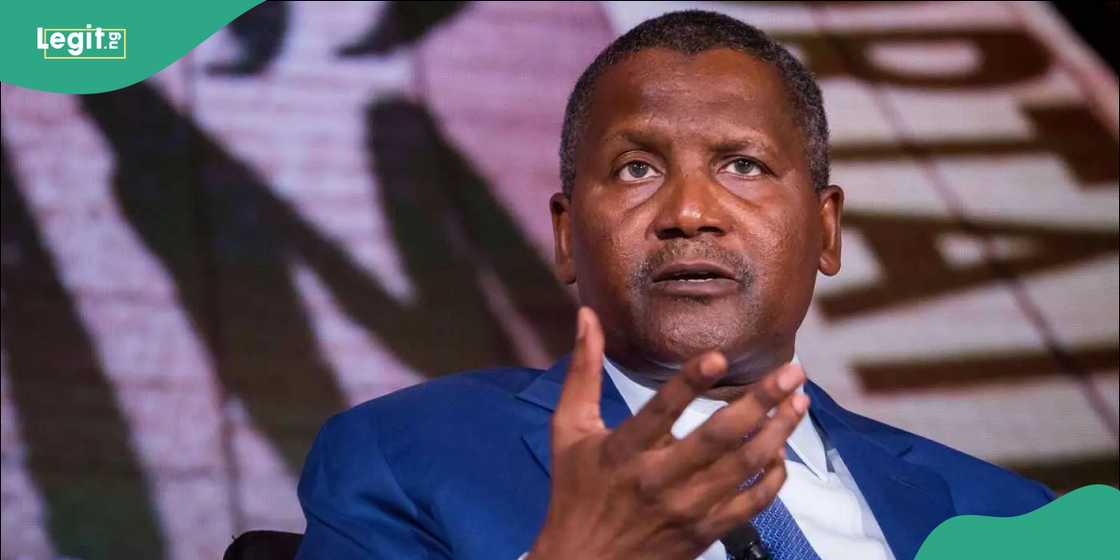Aliko Dangote Finally Responds to Monopoly Accusations Against Company
- Dangote has refuted monopoly claims, which has forced him to shut down plans to invest in Nigeria's steel sector
- The industrialist emphasised that his company competes fairly and does not obstruct others from entering the market
- He noted that while Lafarge was the only operator in the cement industry at a time, it was not accused of monopolistic practices
Legit.ng journalist Victor Enengedi has over a decade's experience covering Energy, MSMEs, Technology and the stock market.
Africa’s wealthiest individual, Aliko Dangote, has refuted claims of monopolistic practices, asserting that his company has never hindered others from entering his industry.
Dangote’s comments followed the board's surprising decision to forgo the steel investment to prevent any allegations of monopolistic conduct.

Source: UGC
Dangote stresses open market practices
During a recent press briefing, the renowned businessman reflected on his entry into cement manufacturing, noting that Lafarge was the sole competitor in the market at the time.
Dangote pointed out that he was accused of monopoly when he began production, clarifying that true monopolistic behaviour involves obstructing competition through legal or other tactics.
He said:
“Nobody ever called Lafarge monopoly. But we, Dangote, the first plant we set up was 45 million tonnes. That was the first one; less than two million of local production.
“But when we got in there, people now started saying monopoly. And this is really very disheartening when people keep talking about this monopoly."
He rejected the monopoly allegations, emphasising that his company competes fairly and does not obstruct others from entering the market.
Dangote's recent business challenges
In June, Dangote accused international oil companies of hindering the refinery's ability to purchase crude oil by inflating prices above the market rate, forcing the refinery to import crude from countries like the US.
The company also criticised the Nigerian Midstream Petroleum Regulatory Authority (NMDPRA) for issuing licenses to oil marketers indiscriminately, resulting in the import of substandard diesel and aviation fuel into Nigeria.
In response, NMDPRA CEO Farouk Ahmed claimed that local refineries, including Dangote’s, produce lower-quality products compared to imports.
Dangote condemned the NDPRA's report criticising the quality of its products, stating that its diesel is 80% superior to the ones imported from abroad.
To defend the quality of his products, Dangote invited members of the House of Representatives to tour his $20 billion, 650,000 barrels per day refinery in Lagos.
In defence of Dangote, Tunde Ogunaike, a social commentator, told Legit.ng that it's better to measure his companies' contribution to Nigeria's economy.
He said:
"Dangote's dominance in various sectors is often criticized as a monopoly, but it's important to consider the broader impact. His businesses have created thousands of jobs, stimulated local economies, and contributed significantly to Nigeria's GDP.
"The scale of Dangote's operations allows for economies of scale, leading to lower prices for consumers. Moreover, Dangote's investments in infrastructure and social projects have had positive ripple effects across the country."
Ogunaike added that while market dominance warrants regulatory oversight to ensure fair competition, Dangote's contributions to Nigeria's economic growth and development cannot be overlooked and are integral to the nation's progress.
Filling stations may adjust fuel pumps
In related news, Legit.ng reported that the price that marketers must pay to import one litre of petroleum from refineries overseas has increased to N1,117/litre.
The Major Energies Marketers Association of Nigeria (MEMAN) revealed the new fuel landing cost to the press on Wednesday, July 17.
In Nigeria, product costs, dealer and insurance margins, shipping costs, government agency fees, finance and banking fees, and storage fees are the main elements that make up the cost of landing gasoline.
PAY ATTENTION: Stay Informed and follow us on Google News!
Source: Legit.ng


